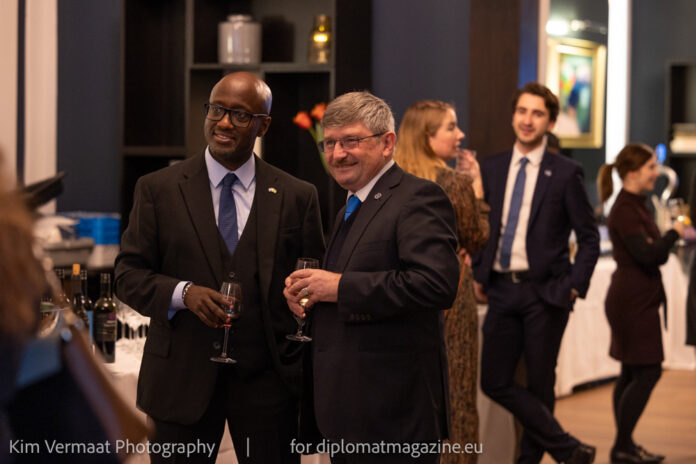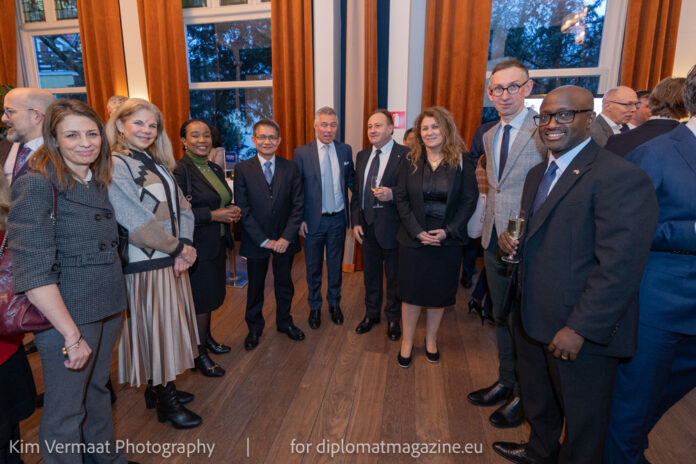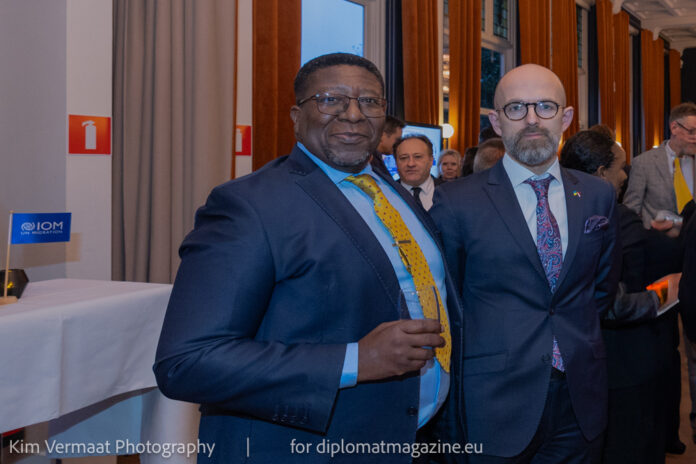In a memorable gathering that combined celebration and reflection, the UN International Organization for Migration (IOM) recently hosted its annual reception, which took on added significance with the announcement of Chief of Mission Antonio Polosa‘s retirement. After an extraordinary 31-year career dedicated to the cause of migration, Polosa’s decision to step down was met with a mix of gratitude, nostalgia, and admiration from more than a hundred colleagues, diplomats, and friends present at the event.
The IOM annual reception, held at the Park Centraal Hotel in The Hague, served as a fitting tribute to Polosa’s immense contributions and tireless commitment. Throughout his tenure, Polosa had been a steadfast presence in migration crises, leading programs for migrants, offering counsel and support to embassies with remarkable discretion and effectiveness and navigating the complexities of migration with diplomacy and empathy.

Guests were treated to a sumptuous international food buffet, reflecting the diversity and richness of cultures that the IOM serves.
Amidst the festivities, heartfelt tributes were paid to Polosa, with colleagues and dignitaries commending his leadership, integrity, and profound impact on the field of migration.
In his retirement announcement, Polosa expressed gratitude for the privilege of serving with the IOM and reflected on the challenges and triumphs of his career. He emphasized the importance of collective action and collaboration in addressing the global migration crisis and expressed confidence in the organization’s continued success.

Polosa remarked, “In our ever more interconnected world, driven by rapid advancement in technology, the phenomenon of human mobility has become an integral aspect of our daily lives, blending cultures and societies, while presenting us with unique opportunities and challenges.”
He continued, quoting the late former IOM Director General, William Lacy Swing, “Migration is not a problem to be solved but a human reality to be managed.” Polosa underscored the vital contributions of migrants from all corners of the globe, highlighting their role in driving development and enriching societies.
“It is essential for our societies to engage in constructive debates about the role of migration particularly at a time when misconceptions often fuel public animosity towards it and impede progress on policy matters.” He said. “While appreciating the positives, it is also incumbent upon us to reflect upon and acknowledge the grim realities that surround unsafe migration patterns,” Polosa remarked somberly. He spoke of the challenges faced by migrants, including the risks of exploitation, human trafficking and the lack of access to basic necessities.

“Since 2014 when IOM began collecting data on migration routes worldwide, more than 59,000 women, men and children have been registered as deceased or missing; The vast majority of which have been in the Mediterranean Sea. These figures don’t even capture deaths that occur in refugee camps, detention facilities, or housing; or take place after deportation or forced return to a migrant’s homeland; or are more loosely connected with migrants’ ‘irregular migration status’, such as those resulting from xenophobia, labor exploitation or other structural discrimination. Up to 75% of those forcibly displaced are hosted in low- or middle-income countries, which puts a strain on host communities and resources. Refugees, asylum seekers, vulnerable migrants, and internally displaced persons (IDPs) often face protection challenges and lack access to shelter, food, and basic healthcare.”
“These unpleasant realities, challenge each and every one of us to renew our commitment to the pursuit of a fairer world; a world where migration works for all and not the fortunate few; a world where the dignity and rights of every human being are respected; a world where migration decisions are made as a matter of choice not necessity.”
Looking to the future, Polosa expressed confidence in the IOM’s continued efforts under the leadership of Director General Amy Pope. He outlined the organization’s strategic plan, emphasizing its commitment to protecting lives. finding effective solutions for displacement and promoting regular pathways to migration.
In closing, Polosa thanked the Netherlands and all partners for their unwavering support. “Here in the Netherlands, we remain dedicated to keep providing assistance to the numerous migrants through supporting their voluntary return and reintegration, resettlement to the Netherlands, their reunification with their families, their inclusion into Dutch society and their protection. The successful implementation of these endeavors is greatly attributed to the strong collaboration we have with the Netherlands as our host government, our partner organizations, diplomatic representations, public institutions, civil society, IOM missions across the globe, and last but not least, with the migrants themselves. Migrants are not just statistics, but people with real stories and real value,” he concluded.
Though Polosa may be retiring, his legacy will continue to inspire and guide the organization’s work for years to come, ensuring that migration remains a force for good in the world.



